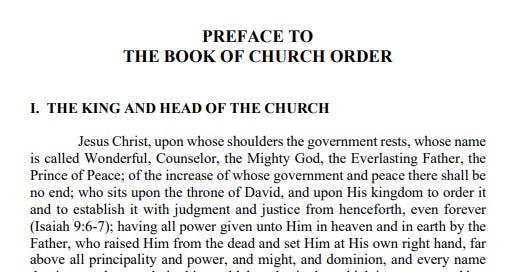By Brad Isbell
Recent events ought to prompt us to think about presbyterian principles, which (because they are biblical) are the best way to provide for the Savior’s sheep in a rightly-ordered church. The ascended Christ gave not only gifts to men in the form of officers but also a form of church government. (see the PCA BCO Preface)
A "senior pastor" is one elder among many (as Peter, Paul, and the unnamed elders were at the Jerusalem Council, Acts 15:23) and has no extraordinary authority.* Unfortunately, some—usually large—presbyterian churches become de facto staff-led rather than elder-led. The senior pastor becomes the CEO leading (pastoring?) the large and powerful ordained and unordained staff. The modern notion of "vision casting" sometimes seeps in from the broader evangelical megachurch milieu, giving the top man even more supposed authority. It is an open question whether the megachurch model can remain (or ever be) presbyterian in any real sense.
Large churches, with the best of intentions, find simplicity almost impossible to retain. They almost inevitably become service providers, and more (not worship) services are added thanks to abundant funding and facilities...which must be used! Churches have complicated organizational charts that resemble those of civil governments, institutions, or corporations. A church with an HR department has probably become too large to be effectively governed on presbyterian principles.
Hired staff (apart from senior and associate pastors, ruling elders, and deacons in the PCA) are in some sense imposed upon the people—hired and overseen by the session, not elected by the congregation, which has no power of removal and no choice in their selection. This is one thing if a janitor or secretary is in view, but some staff members have great ministerial responsibility these days. This, too, would seem to be problematic for presbyterian principles.
Ministry models that expand widely (or veer wildly) beyond the ordinary means of grace and diaconal care require specialists, coordinators, directors, apparatchiks...and structures. Titles and quasi-offices multiply at least sevenfold. Different conceptions of the church’s mission actually produce different types of churches. This creates difficulties in a connectional denomination where common order is the basis for both fellowship and accountability.
It's not simply a matter of size. Some large churches feel small and human-scaled. Some small churches with big ideas become quite complicated. We often talk about simple, ordinary means of grace worship; it is time to talk about simple, ordinary means of grace structure—aka presbyterianism—and its necessity.
* About the only extra power expressly given to the solo (or senior) pastor is the ordinary moderation (or chairing) of meetings: “The pastor is, by virtue of his office, the moderator of the Session”—BCO 12-2 (and congregational meetings—BCO 24-2)




